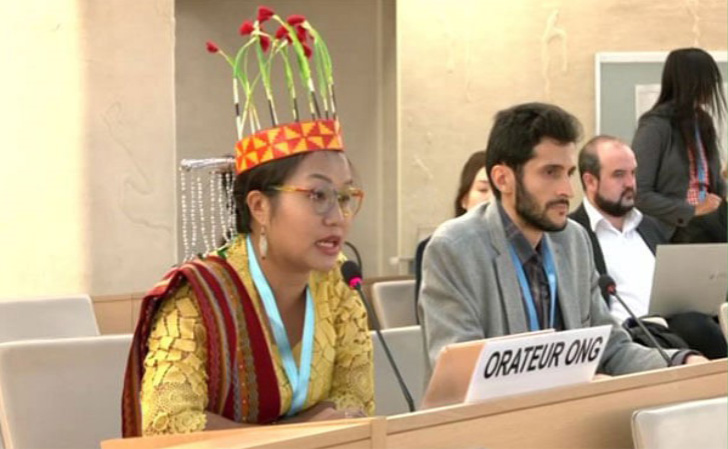Mizoram Woman Activist Counters International Media Narrative About Manipur Violence
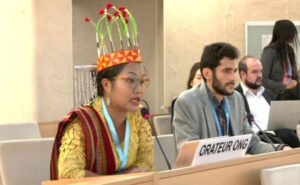
A Christian social activist from Mizoram, Alinery Lianhlawng, told the United Nations that the narratives peddled by the international media on Manipur violence hold no ground and India’s northeast region has rich ethnic diversity, reports said.
Speaking during a general debate at the 54th Session of the UN Human Rights Council in Geneva, Alinery said, “Being an indigenous woman from the NE of India, I have the privilege to shed light on the Manipur conflict and the Government of India’s firm resolve to bring back peace and normalcy in the region.”
“Manipur, with a population of 2.8 million, is home to more than 35 communities, the majority of them can be classified into three main ethnic groups- the Meiteis, the Nagas and the Kukis. Geographically, the state can be divided into two parts – Imphal valley and hill areas,” she said in her intervention.
The valley accounts for just over 11 per cent of the area but is home to 57 per cent of the total population, mainly Meiteis. The hill areas are dominated by Naga and Kuki tribes and comprise 43 per cent of the state’s population.
Alinery said that the present conflict needs to be seen through the prism of complex ethnic relationships. One of the main reasons for this conflict is over land rights, controls and ownership of land between the two communities.
“Therefore, as the narratives peddled by international media have been that the Manipur conflict is of a religious nature holds no ground,” she said.
The truth is that the conflict cannot be described as a religious conflict between the majority Meitei and minority Christian Kukis since the Nagas, who are predominately Christian, are not participants in the conflict. Not to mention part of the Meitei population also practices Christianity.
Alinery told the United Nations, “Thankfully, the Central government of India has tried to stop the conflict by resolving issues of both communities peacefully with continuing dialogue, with peace committee of community leaders belonging to all groups, relief packages and camped across the state.”
Alinery said, “I would beg the honourable council and audience to see the Manipur conflict for what it is, part of the old British ‘Divide and Rule’ policy and take appropriate action to protect the human rights of indigenous people,” reports added.
Meanwhile, the speech of social entrepreneur and activist, Alienery Lianhlawng about Manipur violence has ignited a fervent debate on social media after delivering a speech at the United Nations Human Rights Council (UNHRC) addressing the Manipur ethnic conflict. Her remarks prompted an official statement from L. Ramdinliana Renthlei, General Secretary of Zomi Re-Unification Organisation (ZORO) General Headquarters in Aizawl, disassociating her from representing the Mizo people.
Ramdinliana expressed disappointment with Lianhlawng’s speech and questioned her status as a representative of the Mizo community, citing her marriage to a non-tribal “English” man. Renthlei argued that she should adapt to her husband’s culture and that her identity as a Mizo/Zohnam no longer holds. Ramdinliana emphasized that her words solely represent her individual thoughts and not the collective sentiment of the Zo people.
Her speech sparked a debate in social media some groups criticising her and some speaking in support of her speech. The Karnataka Meitei Association praised Lianhlawng as a Mizo Christian social activist and commended her insightful address on the Manipur conflict during the UN Human Rights Council session in Geneva, reports added.
The association criticized certain Kuki community members for consistently portraying themselves as religious victims and influencing global Christian NGOs. It contended that Manipur’s turmoil arises from issues such as land disputes, demographic imbalances due to immigration from neighboring regions, cross-state mobility, and the prevalence of narco-terrorism activities, including extensive deforestation and poppy cultivation.
Alinery Lianhlawng is the founder of Rochun: Pay It Forward – a social venture aiming to provide access to educational resources and increase the leadership skills of young people in India and Myanmar. Rochun provides both online and physical libraries and aims to set up a library in every school in the Indian state of Mizoram, reports added.
COCOMI Spokesperson Athouba Raises Manipur’s Case in UNHR Council in Geneva
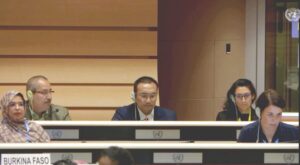
COCOMI Spokesperson and Representative of IPSA Khuraijam Athouba raised the Manipur’s present situation and highlighted the issue of illegal immigrants and narco-terrorism at the United Nations Human Rights Council’s 54th Session in Geneva on September 29.
Khuraijam Athouba spoke at the ‘General Debate Item-5 of the 54th UN Human Rights Council Session presided over by the President of the UNHR Council in Geneva.
The text of Athouba’s sppech is reproduced here.
“Mr. President, today, we draw your attention to a grave and urgent situation faced by the indigenous people of Manipur, India. These indigenous communities stand on the brink of a dire conflict, initiated by cross-border narco-terrorist groups. This conflict has resulted in a tragic toll of over 200 lives lost and the destruction of approximately 5,000 homes, leaving 60,000 people homeless.
Given these distressing circumstances, the peace-loving people of Manipur earnestly appeal to the Indigenous Mechanism and other relevant bodies within this council to facilitate communication with the government of India:
- To prioritize the pressing issue of illegal immigration and the widespread illicit cultivation of opium poppies, covering an area exceeding 10s of thousand acres in the hills of Indo-Myanmar Borderland particularly in Manipur.
- To urge the competent agencies and parties to take urgent initiatives by relevant mandates to address the gross violations of the human rights in the ongoing violence in Manipur.
- To recognize and address the menace of narco-terrorism and emerging new golden triangle and its far-reaching consequences on the longstanding ethnic harmony, economic stability, and ecological well-being of the Indigenous People in Manipur and WESEA region.
- Given the suspected involvement of immigrant armed militant groups in narco-terrorist activities in the region including the ongoing violence in Manipur, we call for a thorough review of the policy of Suspension of Operations with such groups by Government of India.
It is our hope that the Council’s collective efforts will help alleviate the suffering of the indigenous people of Manipur and contribute to a just and peaceful resolution of the current crisis.
I thank you.”
Meitei Diaspora in Europe Stage Protests at United Nations in Geneva
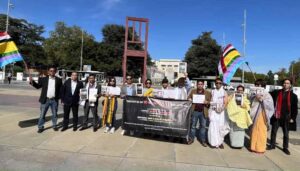
The Meitei Diaspora in Europe staged a protest on September 27 at the Manifest Ground of the United Nations, adjacent to the iconic Broken Chair in Geneva, Switzerland, to highlight the ongoing turmoil in Manipur.
The protest was organized by the Meitei Diaspora in Manipur with Khuraijam Athouba, spokesperson for the Coordinating Committee on Manipur Integrity (COCOMI), an umbrella body of several civil bodies of Manipur.
The event drew participation from numerous Meitei Diaspora representatives hailing from different parts of Europe, the United Kingdom, and Ireland.
Prominent speakers and delegates from the Meitei Diaspora across Europe addressed critical issues relating to the prevailing Manipur Violence and the pressing concern of Narco-Terrorism, which has apparently reduced the southern parts of Manipur to a hub of the infamous Golden Triangle.
Speakers included Khuraijam Athouba, Spokesperson of COCOMI; Sagolsem Biramani, President of the European Manipuri Association (EMA); Okram Bishwajit Singh, Member of EMA; and Yaikhomba Sagolshem, a Meitei student based in London, who discussed the recent dissemination of disturbing images related to the tragic incidents involving Meitei students Linthoingambi and Hemanjit.
After the event, a seven-member delegation from the Meitei Diaspora in Europe, under the leadership of Khuraijam Athouba, visited the United Nations campus. Notably, the 54th Session of the Human Rights Council was in progress in Geneva.
The delegation distributed informative pamphlets and brochures shedding light on the ongoing Manipur Violence, Illegal Immigrants, Narco-Terrorism, and the Emerging Golden Triangle within the campus.
Manipur Crisis Highlighted at Seoul
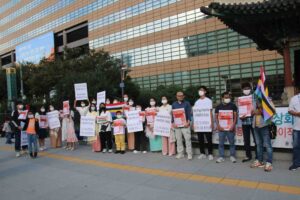
The Global Manipur Federation (GMF), South Korea Chapter has highlighted the “Chin-Kuki narco-terrorism” which has been terrorising Manipur for the past five months.
Members of GMF South Korea Chapter assembled in front of Gwanghwamun Palace, Seoul showing solidarity to all the victims and prayed for justice and peace in Manipur.
The silent demonstration started at 4.15 pm on September 29. The participants highlighted narco-terrorism as a critical cause of the ongoing crisis in Manipur. The placards distributed to the passers-by and the festoons held up by the volunteers read “Pray for Peace in Manipur” and “Stop narco-terrorism in Manipur (India)”.
At the demonstration, Global Manipur Federation, Korea Chapter also expressed heartfelt condolences to the departed souls of the two students, Linthoingambi and Hemanjit feared to be killed brutally by the Kuki militants this July. The gathering condemned the heinous crime committed by the narco-terrorists on the innocent minors, and demanded befitting punishment to criminals.
Again, the gathering decried the cruel and excessive actions of the armed forces and the police which caused numerous injuries to more than 170 students during a rally on September 27 in the (Manipur) valley. Adequate litigation should be administered against the illegal and unwarranted actions of using pellet bullets, fatal explosives and inhuman tortures which are against the Article 19 of the Indian constitution, said a press release issued by GMF South Korea Chapter.
Prior to the gathering, the Manipuri diaspora visited the Indian embassy in Seoul and handed over an urgent appeal on September 28. The appeal underlined the entry of illegal immigrants across the porous Myanmar-Manipur border that has been happening continuously over the last 15 years, and their settlement in the reserved forests which consequently ended in the illegal poppy plantation resulting in mass deforestation in the State.




